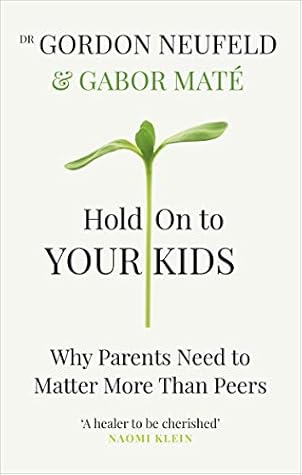More on this book
Community
Kindle Notes & Highlights
Read between
July 18 - November 6, 2021
Curiosity makes a person highly vulnerable in the peer world of “cool.” The wide-eyed wonder, the enthusiasm about a subject, the questions about how things work, the originality of an idea—these all expose a child to the ridicule and shame of peers.
Children learn best when they like their teacher and they think their teacher likes them. The way to children’s minds has always been through their hearts.
In this era of specialization and experts, we may think of teaching as the exclusive duty of teachers. Yet if we recognized the role of attachment in facilitating learning and in preventing peer orientation, we would see that the education of our young is a social responsibility shared equally by parents, teachers, and all the adults who come into contact with our young—and, too, of all those who shape the nature of the society and culture in which children develop and learn about life.
The ultimate gift is to make a child feel invited to exist in our presence exactly as he is, to express our delight in his very being.
The real spoiling of children is not in the indulging of demands or the giving of gifts but in the ignoring of their genuine needs.
The child’s self-image should not rest on how well, or how poorly, she succeeds in gaining our approval by means of achievements or compliant behaviors. The foundation of a child’s true self-esteem is the sense of being accepted, loved, and enjoyed by the parents exactly as he, the child, is.
Ultimatums make the child feel very keenly that her parents love and accept her only conditionally.
parents should never lie to their children. Lies, however innocently intended, cannot protect a child from pain.
I have come to consider the family sit-down meal as one of the most significant attachment rituals of all.
children who are well-connected with their parents are likely to find friends whose families are also more important to them.
Punishment creates an adversarial relationship and incurs emotional hardening. Time-outs to teach a lesson, “tough love” to bring behavior into line, and “1-2-3 Magic”fn1 to make kids comply are tactics that strain the relationship.
The withdrawal of closeness (or threatening its loss) is such an effective means of behavior control because it triggers the child’s worst fear—that of being abandoned.
The child disciplined by means of separation can count on closeness and contact with the parent only when measuring up to the parent’s expectations.
nod, the next direction from the parents would
The principle of connection before direction applies to almost anything, whether asking about homework, requesting help with setting the table, reminding the child about clothes to be hung up, informing that it is time to switch off the television, or confronting on some sibling interaction.
The failure to stand firm when something is immutable provokes the child to seek escape routes from reality, and thus foils the adaptive process.
Intentions are greatly undervalued. The prevailing sentiment in our society is that intentions are not good enough, that only appropriate behavior is to be accepted and applauded. Is not the road to hell paved with good intentions? From a developmental perspective, nothing could be farther from the truth.
We cannot get our children to be more mature than they are, no matter how much we insist they “grow up.” Expecting them to do the impossible is frustrating and, worse, suggests that there is something wrong with them. Children cannot endure such a sense of shame without becoming defensive.
find this true, even with my own grandchildren. My challenge is first to collect them. Once I have, the shyness melts away and they become receptive to my grandparenting.
It is the raw material that is precious and rare—an individuality robust enough to survive the grinding pressures of peer interaction.
If the child’s attachment needs are strong and directed toward peers, she may diminish herself to make things work. She will lose her individuality.
Only a viable relationship with nurturing adults can give birth to true independence and individuality, qualities that we all, as parents, would most want for our children. Only in that context can unfold the fully developed personality, a human being able to respect self and to value the personhood of others.
children have a much greater need for a relationship with themselves than for relationships with peers. There has to emerge a separation between sense of self and inner experience
the problem in our society is not simply that our kids hang out together, but that we actually encourage extensive peer contact, looking to it as the answer to such problems as socialization or boredom or, as I will soon explain, self-esteem.
The challenge in self-esteem is to value one’s existence when it’s not valued by others, to believe in oneself when doubted by others, to accept oneself when judged by others.
We need to value our adult friends who exhibit an interest in our children and to find ways of fostering their relationships with them.
We also need to put a high premium on creating customs and traditions that connect our children to extended family. Being related is not enough—genuine relationship is required.
parenting is not a set of skills and behaviors, but above all a relationship.
We all want to be liked, of course. But the more we do to influence the verdict, the less fulfilling the verdict becomes.
(Michael Rutter, “Parent-Child Separation: Psychological Effects on the Children,”
Bly, The Sibling Society, p. 36.


